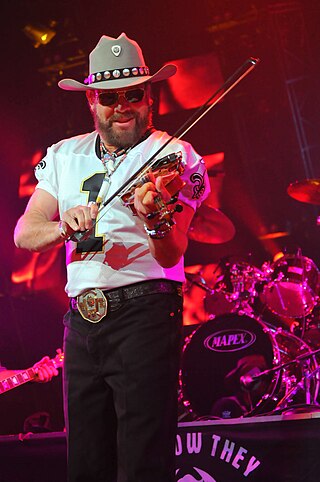
Randall Hank Williams, known professionally as Hank Williams Jr. or Bocephus, is an American singer-songwriter and musician. His musical style is often considered a blend of southern rock, blues, and country. He is the son of country musician Hank Williams and the father of musicians Holly Williams and Hank Williams III.

James Travis Tritt is an American country artist. He signed to Warner Bros. Records in 1989, releasing seven studio albums and a greatest hits package for the label between then and 1999. In the 2000s, he released three studio albums on Columbia Records and one for the now-defunct Category 5 Records. Seven of his albums are certified platinum or higher by the Recording Industry Association of America (RIAA); the highest-certified is 1991's It's All About to Change, which is certified triple-platinum. Tritt has also charted more than 40 times on the Hot Country Songs charts, including five number ones—"Help Me Hold On", "Anymore", "Can I Trust You with My Heart", "Foolish Pride", and "Best of Intentions"—and 15 additional top ten singles. Tritt's musical style is defined by mainstream country and Southern rock influences.
"Jambalaya (On the Bayou)" is a song written and recorded by American country music singer Hank Williams that was first released in July 1952. It is Williams' most covered song. Named for a Creole and Cajun dish, jambalaya, it spawned numerous cover versions and has since achieved popularity in several different music genres.
"Half as Much" is an American pop standard song written by Curley Williams in 1951. It was first recorded by country music singer Hank Williams in 1952 and reached number two on the Billboard Country Singles chart.
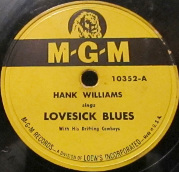
"Lovesick Blues" is a Tin Pan Alley song, composed by Cliff Friend, with lyrics by Irving Mills. It first appeared in the 1922 musical "Oh, Ernest", and was recorded that year by Elsie Clark and Jack Shea. Emmett Miller recorded it in 1925 and 1928, followed by country music singer Rex Griffin in 1939. The recordings by Griffin and Miller inspired Hank Williams to perform the song during his first appearances on the Louisiana Hayride radio show in 1948. Receiving an enthusiastic reception from the audience, Williams decided to record his own version despite initial push back from his producer Fred Rose and his band.
"Murder on Music Row" is a 1999 song written by Larry Cordle and Larry Shell, and originally recorded by American bluegrass group Larry Cordle & Lonesome Standard Time, as the title track from their album Murder on Music Row. It gained fame soon after that when it was recorded as a duet between American country music artists George Strait and Alan Jackson. The song laments the rise of country pop and the accompanying decline of the traditional country music sound; it refers to Music Row, an area in Nashville, Tennessee considered the epicenter of the country music industry.
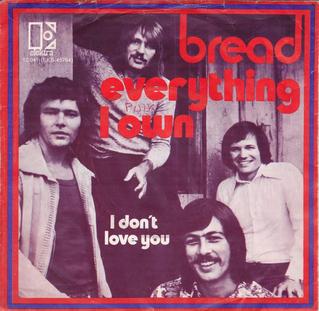
"Everything I Own" is a song written by American singer-songwriter David Gates. It was originally recorded by Gates's soft rock band Bread for their 1972 album Baby I'm-a Want You. The original reached No. 5 on the American Billboard Hot 100. Billboard ranked it as the No. 52 song for 1972. "Everything I Own" also reached No. 5 in Canada and No. 1 in the Philippines.

Mark Nelson Chesnutt is an American country music singer and songwriter. Between 1990 and 1999, he had his greatest chart success recording for Universal Music Group Nashville's MCA and Decca branches, with a total of eight albums between those two labels. During this timespan, Chesnutt also charted twenty top-ten hits on the Billboard Hot Country Songs charts, of which eight reached number one: "Brother Jukebox", "I'll Think of Something", "It Sure Is Monday", "Almost Goodbye", "I Just Wanted You to Know", "Gonna Get a Life", "It's a Little Too Late", and a cover of Aerosmith's "I Don't Want to Miss a Thing". His first three albums for MCA along with a 1996 Greatest Hits package issued on Decca are all certified platinum by the Recording Industry Association of America (RIAA); 1994's What a Way to Live, also issued on Decca, is certified gold. After a self-titled album in 2002 on Columbia Records, Chesnutt has continued to record predominantly on independent labels.

Melba Joyce Montgomery is an American country music singer and songwriter. She is known for a series of duet recordings made with George Jones, Gene Pitney and Charlie Louvin. She is also a solo artist, having reached the top of the country charts in 1974 with the song, "No Charge". Born in Tennessee but raised in Alabama, Montgomery had a musical upbringing. Along with her two brothers, she placed in a talent contest which brought her to the attention of Roy Acuff. For several years she toured the country as part of his band until she signed with United Artists Records in 1963.

Sings Country and Western Hits is the 1961 country music studio album released in May 1961 by George Jones. The album was Jones' tenth studio album release since his debut LP in 1956. It would be one of his last with Mercury Records, as he switched to United Artists in late 1961.
"Why Don't You Love Me" is a song by American singer and guitarist Hank Williams. The song reached number one on the U.S. Country & Western chart. It was released as a single in 1950 with the B-side, "A House Without Love".

Whiskey Bent and Hell Bound is the thirtieth studio album by American country music artist Hank Williams Jr. and his fourth on the Elektra/Curb labels. The full-length album was Williams' second of 1979, with Family Tradition released in April.
"Always Late (with Your Kisses)" is a song co-written and recorded by American country music artist Lefty Frizzell. It was the fifth single released from his 1951/1952 album Listen to Lefty. It peaked at number one in 1951 and became his fourth release to hit the top.
"Take These Chains from My Heart" is a song by Hank Williams. It was written by Fred Rose and Hy Heath and was recorded at Williams' final recording session on September 23, 1952, in Nashville. The song has been widely praised; Williams' biographer Colin Escott deems it "perhaps the best song [Rose] ever presented to Hank...It was one of the very few songs that sounded somewhat similar to a Hank Williams song." Williams is backed by Tommy Jackson (fiddle), Don Helms, Chet Atkins, Jack Shook, and Floyd "Lightnin'" Chance (bass). In the wake of Williams' death on New Year's Day, 1953, the song shot to No. 1, his final chart-topping hit for MGM Records. Like "Your Cheatin' Heart," the song's theme of despair, so vividly articulated by Williams' typically impassioned singing, reinforced the image of Hank as a tortured, mythic figure.
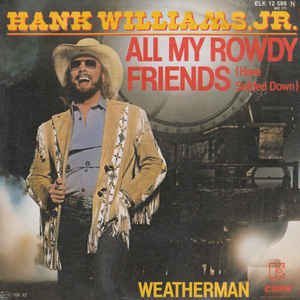
"All My Rowdy Friends (Have Settled Down)" is a song written and recorded by American country music artist Hank Williams Jr. It was released in September 1981 as the first single from the album The Pressure Is On. The song was Williams Jr.'s fifth number one on the country chart. The single stayed at number one for one week and spent a total of ten weeks on the country chart.
"Lost Highway" is a country music song written and recorded by blind country singer-songwriter Leon Payne in 1948. It was released in October 1948 on Nashville-based Bullet label.
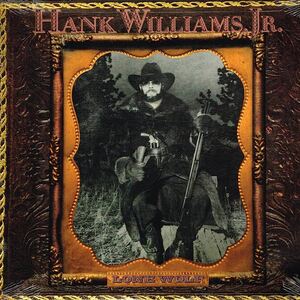
Lone Wolf is the forty-second studio album by American musician Hank Williams Jr. It was released by Warner Bros./Curb Records in January 1990. "Ain't Nobody's Business," "Good Friends, Good Whiskey, Good Lovin'" and "Man to Man" were released as singles. The album peaked at number 2 on the Billboard Top Country Albums chart and has been certified Gold by the RIAA.

Lawton Williams was an American country music singer and songwriter.

"I Can't Help It (If I'm Still in Love with You)" is a song written and originally recorded by Hank Williams on MGM Records. It hit number two on the Billboard country singles chart in 1951. In his autobiography, George Jones printed the first six lines of the song and stated, "Its lyrics couldn't be more simple - or profound."

Lookin' Back is a studio album by American country singer–songwriter Hank Locklin. It was released in July 1969 via RCA Victor Records and contained 11 tracks. The project was produced by Danny Davis and contained no single releases. Lookin' Back centered around cover songs by country and pop artists of the era. It was Locklin's twentieth studio album release in his career.













